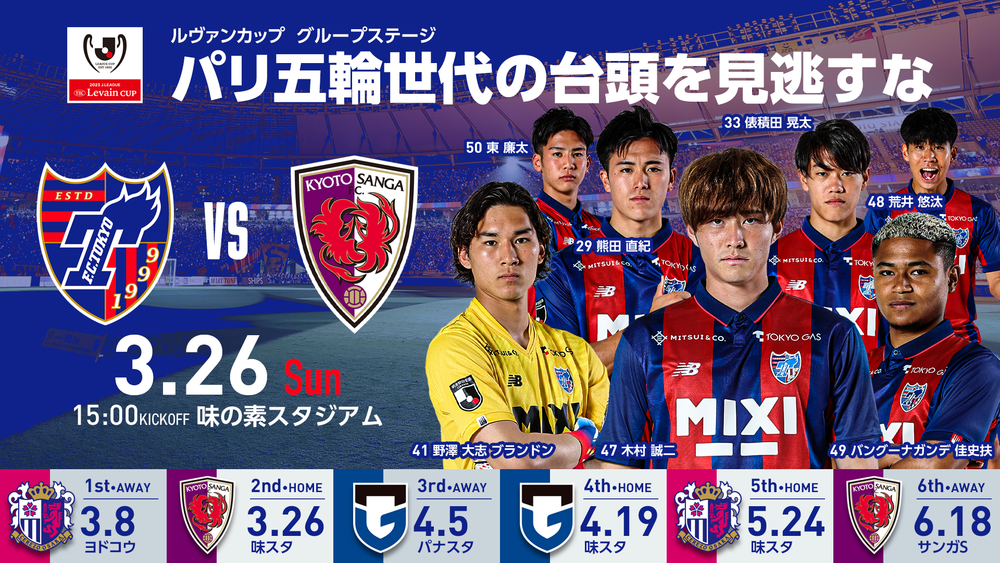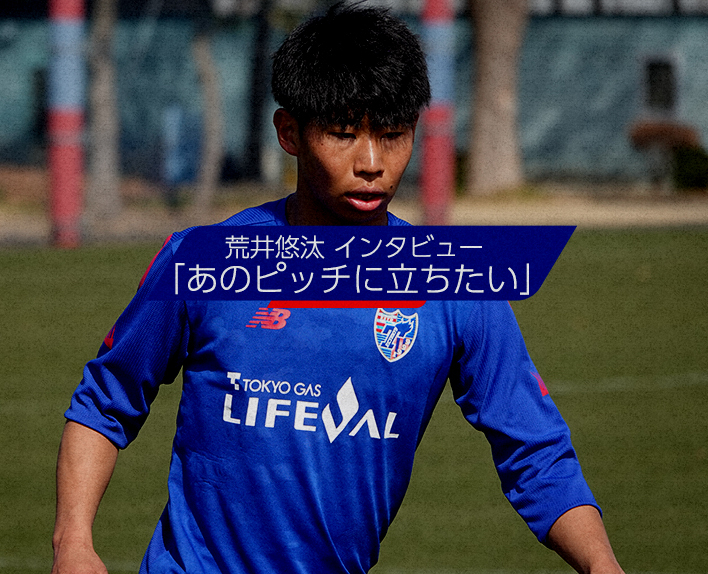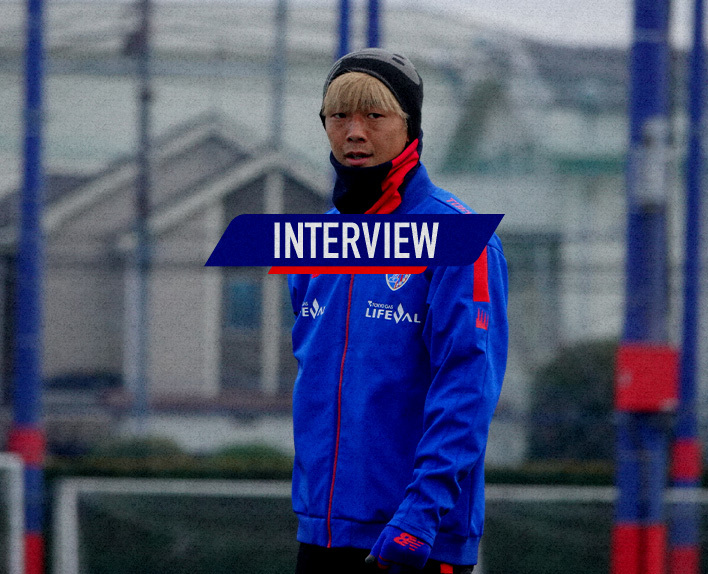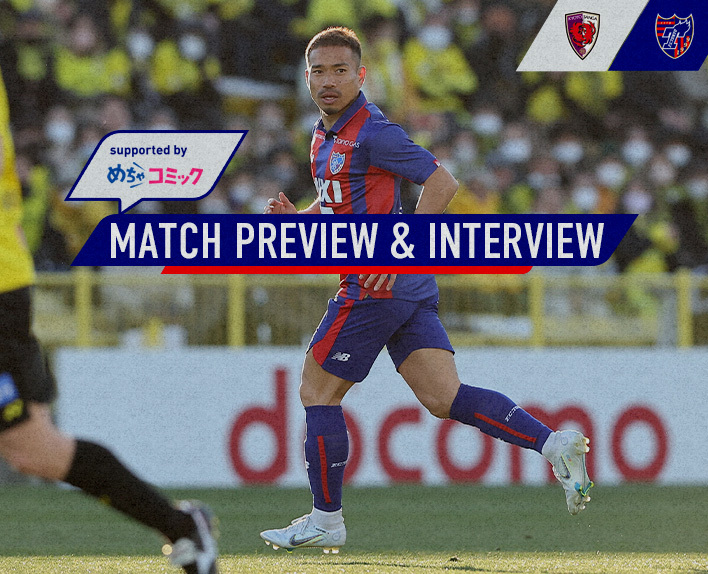Q: What changes have you experienced since your official match debut in Tokyo as a high school student a year ago, compared to now as a professional?
When I was in high school, I practiced for about two weeks before participating in the Levain Cup and then returned to my high school club activities. Now, as a member of a team in Tokyo, I practice with the team every day, so I think the environment has changed significantly.
Q: Do you feel any pressure due to the changes in your environment?
A, since soccer has become my job, I feel a significant responsibility to perform well, as my future depends on my efforts. High school and professional soccer are completely different; I often feel the pressure of training and matches is much greater. I do feel a sense of urgency within myself, but right now I am focusing on what I need to do to outperform players in the same position, and I am working on my own practice after training while discussing with my coach. I want to quickly get used to the intensity of professional training and be able to showcase my own characteristics more.
Q: I think you were communicating with many players and staff during the camp. There were also moments when you went to talk to player Nagatomo, and I believe you gained a lot from that experience.
In Tokyo, soccer requires collaboration with surrounding players, so we value communication with players on the same side. If there are moments during play where the timing is off, we immediately discuss it, prioritizing not losing the ball. We ask whether it would have been better to spread out to the side or to move inside and drop our position. I feel that my play still lacks the necessary forward momentum, so I am learning basic training from player Nagatomo.
Q: There was a discussion about communication with the side-back players, but is there anything you can learn from the play of players in the same position?
A, the players fighting in the top team smoothly pass the ball, making it enjoyable to watch. I want to play that kind of soccer when I get in, so I am reviewing the opening match to learn about each player's movements and the relationship between the full-backs and wingers.
Q: Are there any other challenges in terms of play for player Arai?
A, when I was in high school, I often dribbled from my own half, but my playing style has changed, and I am now using more one-touch and two-touch plays. Since I didn't play that way in high school, I find it challenging, and I feel it is my current issue. I want to smoothly circulate the ball using one-touch and two-touch plays in my own half, and be able to utilize my strength, which is dribbling, in the opponent's area.
Q: You mentioned your strengths, but what do you think are the strengths that Arai has that make him stand out compared to other players?
I think I'm good at one-on-one plays on the side and crossing after cutting in, so I want to share that with my teammates and make plays that lead to goals when we get into the match.
Q: Are there any players you communicate well with, including during your off time?
Recently, I have been spending a lot of time with Shuto ABE and Kuryu MATSUKI. They take care of me and have taken me out for meals. Since Matsuki is away for national team activities, I am with ABE almost every day.
Q: I often see you practicing independently with two other players, but I also have a strong impression that Arai is practicing one-on-one with the coach. Do you approach the coach yourself?
There are times when I go to speak up myself, but recently, Head Coach Anma has been conducting training as instructed by Coach Albert. Previously, Kei KOIZUMI and Abe practiced passing and control every day with a set number of repetitions.
Q, during self-training, do you focus on practicing the areas where you feel you are lacking?
Yes, that's right. Recently, I have been practicing direct passes with Coach Yukihiko SATO. The grass on the professional field allows the ball to slide well, making direct passes difficult and hard to get used to, so I have asked Coach SATO to start with basic training.
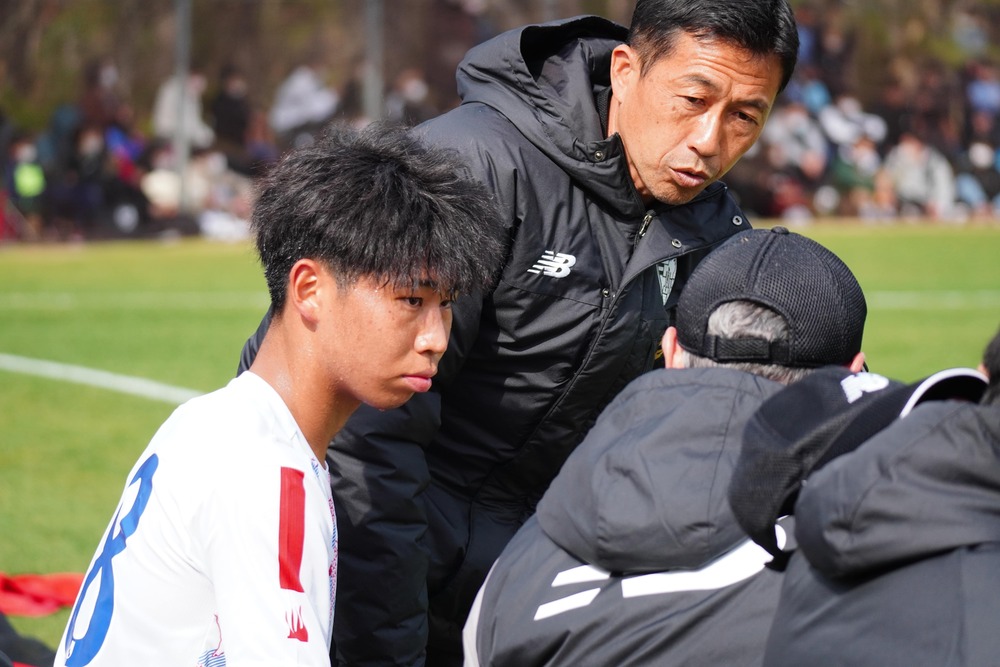
Yuta ARAI receiving instructions from Coach Albert PUIG ORTONEDA during a practice match
Q: On the player profile page of the homepage, you mentioned Kuryu MATSUKI as an influential player.
A, Matsuki has been talking to me a lot since last season and has been looking after me. Now, I really feel the difficulty of performing well in my first year, so I respect Matsuki, who has been playing confidently since his first year last season, and I think I need to work hard as well. There is a lot to learn from Matsuki, so I want to listen to him a lot and connect it to my own growth.
Q: What specifically are you learning from Matsuki?
A, it's about the mental aspect. I used to think that during matches, I should address my seniors with "san" or "kun," but Matsuki calls the players by their names without any honorifics, which shows his strong convictions and mental strength. Additionally, I can feel his courage and strong mentality in moments when he inspires his teammates or gets heated after a foul from the opponent. I think it's truly impressive and something I lack, so I want to strengthen my mental game.
Q: The topic changes a bit, but you mentioned Mahrez as your favorite player in your player profile. Do you usually watch the Premier League?
I often watch Manchester City matches. Their playing style is similar to ours in Tokyo, and I believe Coach Albert PUIG ORTONEDA wants to play that kind of football, as he showed us footage of Manchester City matches during last season's camp. There is a lot to learn from overseas players, and I became a fan after watching left-footed player Mahrez score and assist. Although he is not a physically strong player, I hope to imitate his creativity, like shifting slightly to shoot with his left foot.
Q: Please tell us about your future vision.
First, I want to achieve results in Tokyo before trying to play soccer overseas. But my priority is to excel in Tokyo.

Yuta ARAI training hard at Kodaira Ground
Q: The league season is starting, and the Levain Cup is also beginning. What kind of feelings do you want to approach it with?
As long as I have the opportunity to play, I have a strong desire to score and help the team win. I want to participate in the Levain Cup, achieve results, and be involved in the league matches. First of all, when I get to play in a match, I want to score a goal and make an impression.
Q: With no limit on the number of attendees since the opening match, and the ability to cheer out loud, has your desire to play soccer in that atmosphere strengthened after watching the opening match?
When I was in elementary school, I cheered at the stadium with my relatives. I always wanted to stand on that pitch someday, and I have worked hard without forgetting my efforts, such as practicing on my own, so I want to make that dream come true. I think the atmosphere is amazing, and I believe it would be the best to play in that environment. To play in that place, I think I can only appeal through daily practice and practice matches, so I want to continue my efforts.
Q, the Levain Cup is likely to be a topic of discussion regarding the participation of young players, but do you have any rivals outside of Tokyo players, Arai?
A, it’s players Fukuda Shio and Hiroi Ranto. I became friends with them when we were together in the high school selection during our first year of high school. I have played for three years with the desire not to lose to them, and that feeling hasn’t changed. I want to achieve better results than them.
Q: I believe that fans and supporters are looking forward to seeing Arai's performance. Please share your enthusiasm.A: When I get to play in a match, I will do my best to give my all and contribute to the team. Thank you for your support.
